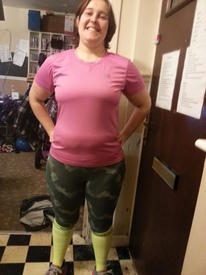Benefits of Gluten free diets for regular folks?

Captain_Tightpants
Posts: 2,215 Member
My wife's doc has recommended a trial period on a Gluten free diet - specifically she recommended the "Wheat Belly" approach.
My wife hasn't been officially diagnosed with any gluten intolerance though, especially not with celiac disease, and since I'm not familiar with gluten free eating, I thought I'd ask you experts about it.
Are there any studies showing the effects of gluten free diets on non-gluten-intolerant people? Are there benefits?
Have any of you heard of or read "Wheat Belly" and what are your opinions on its validity? Just want to make sure this isn't the doc jumping on a fad bandwagon.
Thanks guys! :drinker:
My wife hasn't been officially diagnosed with any gluten intolerance though, especially not with celiac disease, and since I'm not familiar with gluten free eating, I thought I'd ask you experts about it.
Are there any studies showing the effects of gluten free diets on non-gluten-intolerant people? Are there benefits?
Have any of you heard of or read "Wheat Belly" and what are your opinions on its validity? Just want to make sure this isn't the doc jumping on a fad bandwagon.
Thanks guys! :drinker:
0
Replies
-
Hmmm...not sure why it would benefit people who have no problem with gluten, but when I was diagnosed, my dr told me that him and his wife cut it out too 5 years ago even though they have no problem with it.0
-
it benefits the companies who are marketing gluten free foods. Cutting back on pasta and breads isn't such a bad idea...but the gluten free fad is basically just that-- a fad. Only a very small percent of the population really needs to go "gluten free."0
-
I am a coeliac but both my husband and friend( who has had negative blood tests but never had endoscopies) both are also on a gluten free diet. Both have noticed less problems with IBS syndromes to the point that my friends doctor has told her to stay of gluten.
It is also possible to have a gluten intolerance/allergy without having Coeliacs and cutting gluten out of your diet wont harm as long as you make sure you get the proper nutrients.
Though If i had any choice i think I would be straight down the bakery and buying a decent donut.0 -
A little over a week ago yesterday, I began a Wheat Belly experiment myself. I cut out all wheat products and keeping grains like rice and oats to a minimum. I tried some gluten free brownies but other than that, I am not trying to replace wheat products, so no gluten free breads, cereals, etc.
I do suffer from bloating, distension in my abdomen (I get that pregnant pot belly look) and irregularity. I also began taking a fiber supplement and a probiotic. All three of those ailments have improved, I am happy to report. However, I am not sure which one in particular is doing the trick.
It's still pretty early on for me, and I can't say that I've noticed a tremendous, life-changing effect. Interested in hearing other feedback from non-celiacs who have been doing this longer.0 -
i've been gluten free for about a month, and i've had less bloating and irregularity as well. i used to have regular episodes of horrible stomach cramps that would get worse with stress and lack of sleep, and i haven't had any in the last month. it's not a totally conclusive thing for me yet. it really hasn't been a big deal to do it though, so i am gonna stick with it a while before possibly testing it. i actually have several friends not diagnosed with any intolerance that have benefited from it. it's worth a try.
ETA: i have heard of the book but have not read it. my son has been on a GF diet for years, so i already knew all about it.1 -
Here's the manjor con though: Gluten-free food generally tastes like cardboard! Yes, you CAN make G/F stuff that actually tastes good, but it's way easier to make healthy food that isn't G/F that tastes even better!0
-
Here's the manjor con though: Gluten-free food generally tastes like cardboard! Yes, you CAN make G/F stuff that actually tastes good, but it's way easier to make healthy food that isn't G/F that tastes even better!
Must admit this is very true - it is getting better though and I've finally fond a decent bakery for the most gorgeous cakes ( people prefer them to the normal ones). Most of my cooking I don't use replacements except from pasta and labelling on food (in the uk) is getting much better.0 -
I got the eBook version of the "Lose the Wheat, Lose the Weight" book (read it today), and the science behind it made sense. I've been wheat-free all day; feeling a little headachey but nothing I can't handle.0
-
it benefits the companies who are marketing gluten free foods.
Like, farms and ****?0 -
Yes the benefit is lowering the good bacteria in your intestinal tract. Find the study ( i seen it in the past)
This one?
Gut Microbes. 2010 May;1(3):135-137. Epub 2010 Mar 16.
Effects of a gluten-free diet on gut microbiota and immune function in healthy adult humans.
Sanz Y.
Microbial Ecophysiology and Nutrition Group; Institute of Agrochemistry and Food Technology (IATA); Spanish National Research Council (CSIC); Valencia, Spain.
Abstract
Diet is a major environmental factor influencing gut microbiota diversity and functionality, which might be relevant to subjects following dietary therapies. Celiac disease (CD) is an enteropathy caused by an aberrant immune response to cereal gluten proteins and the only therapy is the adherence to a gluten-free diet (GFD). In this context, a preliminary study was conducted to establish whether the GFD in itself could modify the composition and immune properties of the gut microbiota. The trial included 10 healthy subjects (30.3 years-old), which were submitted to a GFD over one month. Analysis of fecal microbiota and dietary intake indicated that numbers of healthy gut bacteria decreased, while numbers of unhealthy bacteria increased parallel to reductions in the intake of polysaccharides after following the GFD. Fecal samples of subjects under a GFD, which represent an altered microbiota, also exerted lower immune stimulatory effects on peripheral blood mononuclear cells than those of subjects on a regular gluten-containing diet. This addendum presents further discussion on the rationale behind these findings, limitations of the study and possible consequences of dietary counselling in the care process of celiac disease patients.
Keep in mind that this was a small, preliminary study. But it does suggest that there may be drawbacks to eliminating gluten unnecessarily.0 -
Their is no benefit, gluten is just protein which helps most people. Wheat is generally bad and appetite enhancing though.0
-
-
I do not have Celiac Disease, but have been gluten free for 11 weeks now as part of the particular diet plan I'm following. The results are no arthritis pain!! Gluten produces inflammation in the body, which causes arthritis pain. I can now even push on my arthritic spots and feel no tenderness at all. After I reach my weightloss goal, I intend to continue being gluten free and arthritis pain free!!0
-
I do eat gluten free and everything I have read says there are no benefits and can even be nutrition risks to eliminating it unnecessarily.
I am guessing your wife's doctor is trying to make a diagnosis with an elimination diet or treat some ailment?0 -
the people on here are hardly "experts"0
-
I gave up gluten 4 weeks ago. Since then I have had no bloating and no problems with constipation which had been an ongoing problem for me. I'm not claiming to be an expert, I'm just telling you what my personal experience has been.
I don't really follow the comment about it being a diet that only benefits the companies that sell gluten free products. Personally, I haven't tried to replace wheat with similar foods. I have increased my meat and vegetable intake to make up the calories, but I haven't bought anything that has gluten free plastered on the wrapper (not that I think there would be anything wrong with that).
My personal theory whenever I have seen questions on here about trying something different -- whether it be with diet or exercise -- is to try it and see what you think for yourself. Give it a couple weeks and if you don't like it then don't do it; if you do like it then carry on. Only you know how your body will react or how you will feel.0 -
if you dont need to i wouldnt recommend it. i'm not celiac but i have allergies to it and it's a pain in the butt being gluten free. the gluten free versions of food are way more expensive .
plus one side effect is that when people jump on he bandwagon, it ends up hurting those of us who actually do need to avoid gluten for legitimate reasons. i recently discovered a pizza place near me that advertised having gluten free dough. i ordered but then i got a skin rash and immediately knew i had gluten. i called them up and someone fessed up that they starting saying they had gluten free stuff because people were jumping on the bandwagon and they didnt think there were medical reasons. apparently they had been making the "gluten free" pizza for months but i was the only one who ever called them on it...0 -
My daughter did a Dr. supervised elimination diet trying to figure out what was going on. She had bloating, IBS, and stomach cramping. They have isolated her problem as being wheat and corn although not specifically gluten. For her, removing the two offenders has made her feel much better. She is still able to eat potatoes and other grains.
It seems that removing offending foods will make a person feel better so figuring out what it is that is causing you problems is worth the time.
I don't see how gluten free can help someone with no gluten intolerance. I low carbed for months, and it was very low carb, due to my uncontrolled blood glucose. So since I was eating only non-starchy veggie carbs and one piece of fruit I should have lost a ton of weight. I didn't lose a thing nor did I gain when I was put on different meds that allowed me to reintroduce carbs.
In my opinion, and I'm not a dr. or anything, if you have a problem, removing offending foods will make you feel a lot better and may help you lose some weight. If no foods cause you problems then it seems silly to remove them. Seriously, are you really going to never eat bread again because some book tells you to? Trust me, even with a medical condition that could cause a great deal of damage, I still wanted bread and felt very deprived but knew I couldn't eat much of it. If I hadn't had a medical condition I could never have low carbed as long as I did.1 -
That is so wrong, and I believe illegal.if you dont need to i wouldnt recommend it. i'm not celiac but i have allergies to it and it's a pain in the butt being gluten free. the gluten free versions of food are way more expensive .
plus one side effect is that when people jump on he bandwagon, it ends up hurting those of us who actually do need to avoid gluten for legitimate reasons. i recently discovered a pizza place near me that advertised having gluten free dough. i ordered but then i got a skin rash and immediately knew i had gluten. i called them up and someone fessed up that they starting saying they had gluten free stuff because people were jumping on the bandwagon and they didnt think there were medical reasons. apparently they had been making the "gluten free" pizza for months but i was the only one who ever called them on it...0 -
That is so wrong, and I believe illegal.if you dont need to i wouldnt recommend it. i'm not celiac but i have allergies to it and it's a pain in the butt being gluten free. the gluten free versions of food are way more expensive .
plus one side effect is that when people jump on he bandwagon, it ends up hurting those of us who actually do need to avoid gluten for legitimate reasons. i recently discovered a pizza place near me that advertised having gluten free dough. i ordered but then i got a skin rash and immediately knew i had gluten. i called them up and someone fessed up that they starting saying they had gluten free stuff because people were jumping on the bandwagon and they didnt think there were medical reasons. apparently they had been making the "gluten free" pizza for months but i was the only one who ever called them on it...
i know! i'm thinking the only reason why they havent really been in trouble was because no one has gotten really sick.
i belong to a gluten free group who are mainly celiacs. apparently the celiacs just dont even bother with anything bread like unless they are making it themselves from scratch because the stakes are so much higher for them than someone like me.
if i eat a pizza or several slices of regular bread i only get bloating, hot, itch ears and itchy rash skin that's uncomfortable for a few hours unless i take antihistamine but it's not life threatening. a celiac on the the other hand would need to be rushed to the hospital for that same amount.0 -
Gluten-free bread products are higher calorie than normal, so it can cause weight gain if you're not careful with it. 50/50 split tastes like cardboard or decent. Expensive. Pain in the *kitten*. Etc. I only do it for medical reasons.0
-
I was just a "regular" person as far as I knew, no problems with gluten. Until I stopped eating it and realized you can go through life THINKING you feel "good" (normal) until you feel GREAT and realize that "good" was only OKAY. My IBS was gone within a month. With no other change to my exercise or lifestyle, I've lost 30+ lbs since cutting out all grains (not just gluten, but ALL grains.) My rosacea is also gone, I no longer have to take daily antibiotics to control it (Rosacea is in the "allergy family", like Eczema.) I don't buy "gluten-free" products (ie: replacements for gluten products, like gluten-free breads and cereals), I just choose to not eat them at all. It usually isn't too difficult. I don't know if everyone should try it, but I know for me, it made an actual, significant, difference.0
-
and your expertise is stating the obvious, obviously.the people on here are hardly "experts"0 -
Yes the benefit is lowering the good bacteria in your intestinal tract. Find the study ( i seen it in the past)
This one?
Gut Microbes. 2010 May;1(3):135-137. Epub 2010 Mar 16.
Effects of a gluten-free diet on gut microbiota and immune function in healthy adult humans.
Sanz Y.
Microbial Ecophysiology and Nutrition Group; Institute of Agrochemistry and Food Technology (IATA); Spanish National Research Council (CSIC); Valencia, Spain.
Abstract
Diet is a major environmental factor influencing gut microbiota diversity and functionality, which might be relevant to subjects following dietary therapies. Celiac disease (CD) is an enteropathy caused by an aberrant immune response to cereal gluten proteins and the only therapy is the adherence to a gluten-free diet (GFD). In this context, a preliminary study was conducted to establish whether the GFD in itself could modify the composition and immune properties of the gut microbiota. The trial included 10 healthy subjects (30.3 years-old), which were submitted to a GFD over one month. Analysis of fecal microbiota and dietary intake indicated that numbers of healthy gut bacteria decreased, while numbers of unhealthy bacteria increased parallel to reductions in the intake of polysaccharides after following the GFD. Fecal samples of subjects under a GFD, which represent an altered microbiota, also exerted lower immune stimulatory effects on peripheral blood mononuclear cells than those of subjects on a regular gluten-containing diet. This addendum presents further discussion on the rationale behind these findings, limitations of the study and possible consequences of dietary counselling in the care process of celiac disease patients.
Keep in mind that this was a small, preliminary study. But it does suggest that there may be drawbacks to eliminating gluten unnecessarily.
Lower immune stimulatory effects would be good if you have an auto-immune condition.
Did they eat gluten-free polysaccharide sources?
Okay in the study:
"Moreover, the findings suggest that dietary counselling aimed at promoting polysaccharide and probiotic intake could be considered in the care process of treated patients in the future."
So just have to make sure to eat gluten-free polysaccharide sources when eliminating gluten and consider a probiotic (supps or food sources).
"Gluten is not an essential nutrient. Therefore, replacing the gluten in your diet with whole foods such as vegetables, fruits, beans, nuts, seeds, wild fish, and whole, gluten-free grains will result in a more nutritious diet. Processed baked goods of any kind, with gluten or gluten-free, are less nutritious than whole foods and should not be the foundation for any healthy diet."
http://www.fitnessgoop.com/2011/02/can-eliminating-gluten-be-unhealthy/0 -
That is so wrong, and I believe illegal.if you dont need to i wouldnt recommend it. i'm not celiac but i have allergies to it and it's a pain in the butt being gluten free. the gluten free versions of food are way more expensive .
plus one side effect is that when people jump on he bandwagon, it ends up hurting those of us who actually do need to avoid gluten for legitimate reasons. i recently discovered a pizza place near me that advertised having gluten free dough. i ordered but then i got a skin rash and immediately knew i had gluten. i called them up and someone fessed up that they starting saying they had gluten free stuff because people were jumping on the bandwagon and they didnt think there were medical reasons. apparently they had been making the "gluten free" pizza for months but i was the only one who ever called them on it...
i know! i'm thinking the only reason why they havent really been in trouble was because no one has gotten really sick.
i belong to a gluten free group who are mainly celiacs. apparently the celiacs just dont even bother with anything bread like unless they are making it themselves from scratch because the stakes are so much higher for them than someone like me.
if i eat a pizza or several slices of regular bread i only get bloating, hot, itch ears and itchy rash skin that's uncomfortable for a few hours unless i take antihistamine but it's not life threatening. a celiac on the the other hand would need to be rushed to the hospital for that same amount.
Actually, that's not true at all, at least not for most folks with celiac. Most people who have celiac disease have it for months or even years before they figure out what the issue is and they are not constantly rushed to the hospital. It often can be misdiagnosed as IBS or Krohn's as most symptoms are GI related. They would probably just get really sick feeling in the stomach and have diarrhea.
A lot of folks who don't have celiac disease who go gluten free lose a bit of weight, mainly cause they're cutting significant carbs and don't replace the calories they were eating with bread, pasta, etc. My friend actually gained weight once he moved to a gluten-free diet as his body was finally properly absorbing nutrients.
I'm not aware of any health benefits for going gluten-free for folks who don't have wheat allergies or celiac disease. As long as you're getting in proper nutrients it probably won't hurt you in the short term, though.0 -
If you aren't gluten intolerant, it will not have any overall effect on health. You will most likely drop water weight, as eliminating gluten will generally lead to a serious reduction in carbs, which leads to a loss in water weight because the body will store less glycogen. Otherwise, it's won't have any negative effects, but won't really have any positive differences either.
If a doctor is suggesting it, I'd assume they are looking for a potential gluten intolerance issue, as cutting out gluten is a good way to test that.0 -
If you're not intolerant, I wouldn't suggest it. Both my sisters have celiac and I wouldn't wish it on anyone. Honestly, I think it's stupid to cut anything out of your diet unless you have to. If you're lucky enough to be able to have it, then don't take it for granted. Just eat. In a year there will be another fad out there.0
-
Lots of people don't know that they are sensitive to wheat till they try going off of it. It can cause inflamation in the joints, indigestion, headaches, poor concentration, irritability, unexplained rash, bloating and all sorts of things that you might not expect it to. And it can be hard to determine if it is wheat or gluten. On the other hand wheat can be a completely healthy part of some ones diet.
Why? One explanation is that we have basicaly one type of geneticaly modified (to contain more gluten) wheat used for 90% of wheat products. Also people are looking to have whole grain bread be as fluffy and light and bound together as the wonder bread they had as children. To do this the bakery adds more gluten into the whole grain mixes. Now the typical diet contains more bread products than ever before. Pretty much every meal and snack.
If you want to know if wheat or gluten is causing you the sypmtoms you could try a 2 week gluten free fast. Not easy as most sauce, soups, processed meats and even some yogurts and cottage cheese contain gluten. (and stupid things like flour dusted cranberries)
If you feel noticeably better after 2 weeks then add in spelt, kumut, oats and other grains that contain small amounts of gluten and see if these bother you. (gluten test)
If not then try adding wheat back. (wheat test)
It may seem extreem but it took me two decades to figure out I was celiac. I always knew wheat made me ill. But my immune system never healed till I cut out all gluten. Now I consider myself healthy.
Up to you.0 -
If you aren't gluten intolerant, it will not have any overall effect on health. You will most likely drop water weight, as eliminating gluten will generally lead to a serious reduction in carbs, which leads to a loss in water weight because the body will store less glycogen. Otherwise, it's won't have any negative effects, but won't really have any positive differences either.
If a doctor is suggesting it, I'd assume they are looking for a potential gluten intolerance issue, as cutting out gluten is a good way to test that.
To test you have a gluten problem you cant be off gluten, you have to have it in your diet whilst being tested otherwise won't be accurate. But being off gluten you will see less bloating etc.0 -
My wife's doc has recommended a trial period on a Gluten free diet - specifically she recommended the "Wheat Belly" approach.
My wife hasn't been officially diagnosed with any gluten intolerance though, especially not with celiac disease, and since I'm not familiar with gluten free eating, I thought I'd ask you experts about it.
Are there any studies showing the effects of gluten free diets on non-gluten-intolerant people? Are there benefits?
Have any of you heard of or read "Wheat Belly" and what are your opinions on its validity? Just want to make sure this isn't the doc jumping on a fad bandwagon.
Thanks guys! :drinker:
My suggestion would be to cut out all gluten products for 8 weeks. That means learning all the alternative names for wheat and gluten so you can read labels carefully.
If after 8 weeks you feel healthier, stronger, better, eliminate it from your diet. If you don't feel any different then keep eating it.
No scientific paper, doctor, expert, nutritionist, or MFP member can tell you how YOU will feel until you try this for yourself. We can only share experiences and opinion but it's not the same thing. You live in your body. we don't 0
0
This discussion has been closed.
Categories
- All Categories
- 1.4M Health, Wellness and Goals
- 398.1K Introduce Yourself
- 44.7K Getting Started
- 261K Health and Weight Loss
- 176.4K Food and Nutrition
- 47.7K Recipes
- 233K Fitness and Exercise
- 462 Sleep, Mindfulness and Overall Wellness
- 6.5K Goal: Maintaining Weight
- 8.7K Goal: Gaining Weight and Body Building
- 153.5K Motivation and Support
- 8.4K Challenges
- 1.4K Debate Club
- 96.5K Chit-Chat
- 2.6K Fun and Games
- 4.8K MyFitnessPal Information
- 12 News and Announcements
- 21 MyFitnessPal Academy
- 1.5K Feature Suggestions and Ideas
- 3.2K MyFitnessPal Tech Support Questions



















